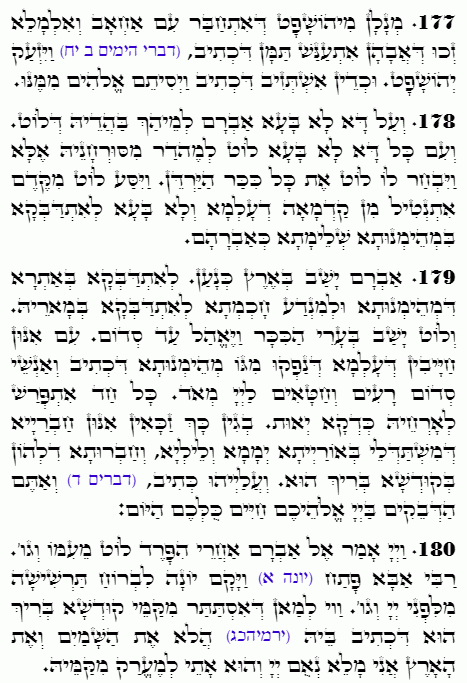Daily Zohar # 4697 – Lech Lecha – Can’t flee from Hashem
Daily Zohar 4697

Hebrew translation:
178. וְעַל כֵּן לֹא רָצָה אַבְרָם לָלֶכֶת עִם לוֹט. וְעִם כָּל זֶה לֹא רָצָה לוֹט לַחֲזֹר מִסּוּרוֹ הָרָע, אֶלָּא וַיִּבְחַר לוֹ לוֹט אֵת כָּל כִּכַּר הַיַּרְדֵּן וַיִּסַּע לוֹט מִקֶּדֶם. נָסַע מִקַּדְמוֹנוֹ שֶׁל הָעוֹלָם, וְלֹא רָצָה לִדְבֹּק בָּאֱמוּנָה הַשְּׁלֵמָה כְּמוֹ אַבְרָהָם.
179. אַבְרָם יָשַׁב בְּאֶרֶץ כְּנָעַן, לְהִדָּבֵק בִּמְקוֹם הָאֱמוּנָה וְלָדַעַת הַחָכְמָה לְהִדָּבֵק בְּרִבּוֹנוֹ. וְלוֹט יָשַׁב בְּעָרֵי הַכִּכָּר וַיֶּאֱהַל עַד סְדֹם, עִם אוֹתָם הָרְשָׁעִים שֶׁל הָעוֹלָם שֶׁיָּצְאוּ מִתּוֹךְ הָאֱמוּנָה, שֶׁכָּתוּב וְאַנְשֵׁי סְדֹם רָעִים וְחַטָּאִים לַה’ מְאֹד. כָּל אֶחָד נִפְרַד לְדַרְכּוֹ כָּרָאוּי. מִשּׁוּם כָּךְ אַשְׁרֵיהֶם הַחֲבֵרִים שֶׁמִּשְׁתַּדְּלִים בַּתּוֹרָה יוֹמָם וָלַיְלָה, וְהַחֲבֵרוּת שֶׁלָּהֶם עִם הַקָּדוֹשׁ בָּרוּךְ הוּא, וַעֲלֵיהֶם כָּתוּב (דברים ד) וְאַתֶּם הַדְּבֵקִים בַּה’ אֱלֹהֵיכֶם חַיִּים כֻּלְּכֶם הַיּוֹם.
180. וַה’ אָמַר אֶל אַבְרָם אַחֲרֵי הִפָּרֶד לוֹט מֵעִמּוֹ וגו’. רַבִּי אַבָּא פָּתַח, (יונה א) וַיָּקָם יוֹנָה לִבְרֹחַ תַּרְשִׁישָׁה מִלִּפְנֵי ה’ וגו’. אוֹי לְמִי שֶׁמִּסְתַּתֵּר מִלִּפְנֵי הַקָּדוֹשׁ בָּרוּךְ הוּא, שֶׁכָּתוּב בּוֹ (ירמיה כג) הֲלוֹא אֶת הַשָּׁמַיִם וְאֶת הָאָרֶץ אֲנִי מָלֵא נְאֻם ה’, וְהוּא בָּא לִבְרֹחַ מִלְּפָנָיו?!
.
Zohar Lech Lacha
Continued from previous DZ
#177
How do we know this? From the example of Jehoshaphat, who associated himself with Ahab. Had it not been for the merit of his forefathers, he would have been punished on his behalf, as it is written, “ויצעק יהושפט” “Jehoshaphat cried out…” (2 Chronicles 18:31), and then he was saved, as it is written, “וַיְסִיתֵם אֱלֹהִים מִמֶּנּוּ” “And God diverted them from him” (2 Chronicles 18:31).
Notes:
Jehoshaphat’s alliance with Ahab illustrates the risks involved in associating with the wicked. Jehoshaphat’s decision nearly led to disaster, but he was saved due to the merit of his forefathers and his appeal to Hashem.
#178
Therefore, Abraham did not want to go with Lot. Despite this, Lot did not want to repent from his wrongdoing. Instead, “וַיִּבְחַר לוֹ לוֹט” “Lot chose for himself…” (Genesis 13:11) and “וַיִּסַּע לוֹט מִקֶּדֶם” “Lot journeyed from the east,” meaning that he journeyed away from the Ancient One of the World (refers to the Creator) and did not wish to adhere to complete faith like Abraham.
Notes:
Lot’s decision to separate from Abraham exemplifies the dangers of distancing oneself from connection to Hashem. Lot’s choice to journey “from the East” symbolizes a rejection of the Creator and a refusal to align with Abraham’s path of complete faith. By contrasting Abraham’s unwavering dedication with Lot’s choice of worldly pursuits, the Zohar teaches that spiritual integrity requires a commitment to Torah laws and principles. The passage serves as a reminder of the consequences of abandoning faith and the value of remaining true to one’s spiritual path.
#179
“אַבְרָם יָשַׁב בְּאֶרֶץ כְּנָעַן” “Abram dwelled in the land of Canaan” (Genesis 13:12). The land of Canaan symbolizes the Nukva. The phrase “Abram dwelled in the land of Canaan” means that he chose to connect to the place of faith, which represents the Nukva, and to attain the wisdom of his Master. But “וְלוֹט יָשַׁב בְּעָרֵי הַכִּכָּר וַיֶּאֱהַל עַד סְדֹם” “Lot dwelled in the cities of the plain and pitched his tent as far as Sodom” (Genesis 13:12), meaning that he associated himself with the wicked people of the world who had left the path of faith, as it is written about them, “וְאַנְשֵׁי סְדֹם רָעִים וְחַטָּאִים לַה’ מְאֹד” “The people of Sodom were wicked and sinners against YHVH exceedingly” (Genesis 13:13). Each went their separate way as befitting them: Abraham toward holiness, and Lot toward the wicked people of the world. Therefore, blessed are the friends who engage in Torah day and night and whose connection is with the Holy One, Blessed be He, as they act in the way of Abraham and not in the way of Lot. About them, it is written, “וְאַתֶּם הַדְּבֵקִים בַּה’ אֱלֹהֵיכֶם חַיִּים כֻּלְּכֶם הַיּוֹם” “But you who cling to the Lord your God are all alive today” (Deuteronomy 4:4).
#180
“וַה’ אָמַר אֶל אַבְרָם אַחֲרֵי הִפָּרֶד לוֹט מֵעִמּוֹ” “And YHVH said to Abram, after Lot had separated from him…” (Genesis 13:14). Rabbi Abba opened with the verse, “וַיָּקָם יוֹנָה לִבְרֹחַ תַּרְשִׁישָׁה מִלִּפְנֵי ה’” “And Jonah rose up to flee to Tarshish from before YHVH…” (Jonah 1:3). Woe to anyone who tries to hide from the Holy One, Blessed be He, for it is written, “הֲלוֹא אֶת הַשָּׁמַיִם וְאֶת הָאָרֶץ אֲנִי מָלֵא נְאֻם ה’” “Do I not fill the heavens and the earth? Says YHVH” (Jeremiah 23:24). He wonders: did Jonah really think he could flee from before the Holy One, Blessed be He.?
Notes:
The Zohar parallels Jonah’s attempt to flee from Hashem and Lot’s separation from Abram, illustrating the futility of escaping Hashem’s presence. This passage teaches that God’s presence fills all creation, and one cannot evade spiritual responsibilities or divine purpose. As in Lot’s case, the departure of negative influences can open the way for a deeper connection, as seen when Hashem speaks to Abram after Lot’s departure. This message encourages individuals to confront their spiritual duties directly and to choose companions and paths that support their alignment with Hashem’s will.
{||}

 Previous: Lech Lecha
Previous: Lech Lecha

